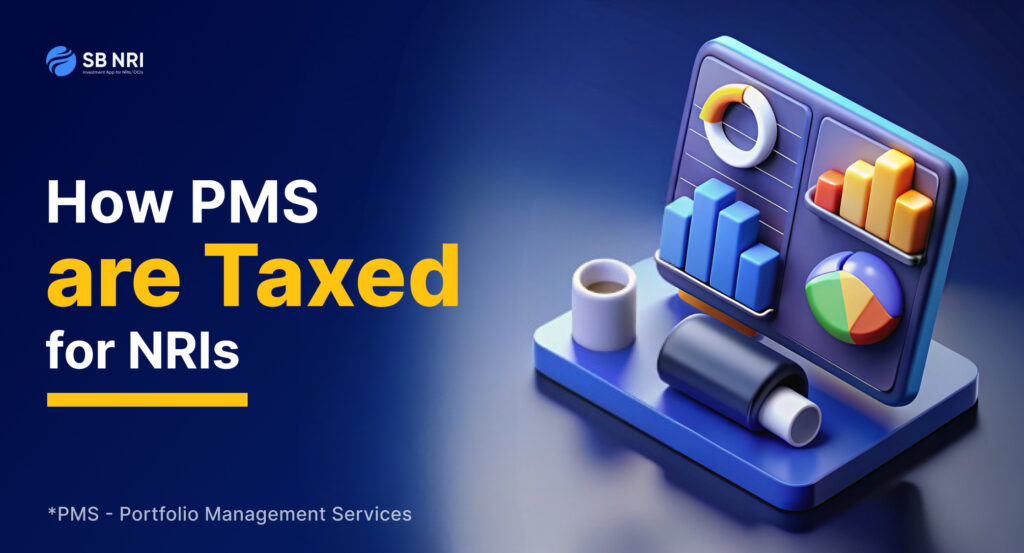
Portfolio Management Services (PMS) have become a popular choice among NRIs who want professional management of their Indian equity and debt portfolios. But before investing, it is essential to understand how PMS is taxed in India, as taxation directly impacts your post-tax returns.
Unlike mutual funds where taxation happens at the fund level, PMS follows a direct, transparent, and investor-led structure. This means you (the NRI investor) own the stocks directly in your Demat account and are personally responsible for paying taxes in India.
Let’s break down PMS taxation for NRIs in FY 2024-25.
1. How PMS is Structured for NRIs
- Direct Ownership: The securities are held in your own Demat account, not pooled with others like mutual funds.
- Pass-Through Taxation: Income (gains, dividends, or interest) flows directly to you. The PMS provider does not pay tax on your behalf.
- You File, You Pay: NRIs must declare PMS income in their ITR (usually ITR-2 or ITR-3) and pay the applicable taxes.
2. Tax Treatment of PMS Income
a) Capital Gains Tax
Profits from buying and selling securities are taxed as capital gains.
- Short-Term Capital Gains (STCG):
- Listed Equity: Held ≤ 12 months → Taxed at 20% + surcharge & cess.
- Unlisted Bonds/Debt: Held ≤ 36 months → Taxed as per your income tax slab rate.
- Long-Term Capital Gains (LTCG):
- Listed Equity: Held > 12 months → Taxed at 12.5% on gains exceeding ₹1 lakh.
- Unlisted Bonds/Debt: Held > 36 months → Taxed at 12.5%.
Earlier LTCG on equities was 10%, but from FY 2024-25 onwards, it is 12.5%.
b) Dividend Income
- Taxed at your applicable slab rate.
- TDS of 10% applies if dividends exceed ₹5,000 in a financial year.
c) Interest Income
- Taxed under “Income from Other Sources” at your slab rate.
3. Key Deductions and Charges
- PMS Fees:
- If you report income as capital gains, fees are usually not deductible.
- If you classify income as business income, PMS fees become deductible.
- The service provider must bill fees separately.
- STT (Securities Transaction Tax) & GST: Not deductible from taxable gains.
- Exit Load: No exit load if investment continues beyond 2 years.
4. Capital Gains vs. Business Income Debate
One of the grey areas for PMS taxation is whether income should be treated as capital gains or business income.
- Capital Gains Approach: Common for investors with moderate trading activity and longer holding periods.
- Business Income Approach: Sometimes adopted when trading is frequent, and intention is closer to “business.”
Since there’s no explicit law, consistency is key. Stick to one approach and seek advice from a Chartered Accountant to avoid disputes.
5. Filing and Advance Tax for NRIs
- ITR Forms: ITR-2 or ITR-3 (depending on how you report income).
- Advance Tax: If your annual tax liability exceeds ₹10,000, you must pay advance tax in quarterly installments.
- Double Taxation Relief: NRIs can claim DTAA (Double Tax Avoidance Agreement) benefits if applicable in their country of residence.
6. PMS vs. Mutual Funds (Quick Comparison for NRIs)
| Feature | PMS | Mutual Funds |
|---|---|---|
| Ownership | Direct stocks in your Demat | Fund units only |
| Taxation | Direct, investor pays | Pass-through; tax rules predefined |
| Customization | High (tailored strategies) | Standardized |
| Minimum Investment | ₹50 lakhs | As low as ₹1,000 |
| Expenses Deduction | Allowed in some cases | Not allowed |
7. Why Understanding PMS Taxation Matters for NRIs
- Maximize Post-Tax Returns: Choosing the right structure and holding period helps save taxes.
- Better Financial Planning: Knowing tax rules upfront allows smarter investment allocation.
- Avoid Compliance Hassles: NRIs must file taxes in India for PMS; staying compliant prevents penalties.
Final Word: Plan Your PMS Taxes Smartly
For NRIs, PMS is a powerful investment avenue offering professional management and direct ownership of Indian assets. However, taxation is complex and must be factored into every decision.
At SBNRI, we simplify this for you:
- Compare PMS providers and post-tax returns.
- Help with TDS, advance tax, and DTAA claims.
- Connect you with expert CAs who specialize in NRI taxation.
Ready to maximize your post-tax PMS returns?
Talk to an NRI tax expert on SBNRI today!



